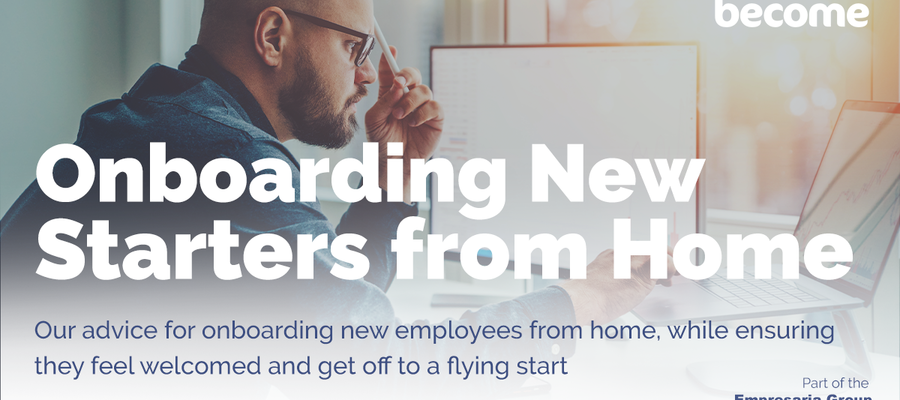Outlining best practices for onboarding new starters while working remotely
The world pandemic, COVID-19, has resulted in many of us facing unprecedented circumstances and has required companies around the world to adapt quickly in order to ensure the safety and wellbeing of their employees.
As businesses begin to embrace remote working, a new and flexible approach must be taken to what was once more rigid and structured processes, including that of onboarding new staff.
There are many companies, big and small, that are formed entirely of remote workers who have successfully grown for many years prior to today’s challenges. So, it’s important to remember that although it may feel like unchartered territory right now, your onboarding process can be just as successful as it was when you were in the office, if not more.
Deal or no deal?
The pandemic has created an air of uncertainty, especially for companies who were or are still growing in numbers. However, if you are considering making an offer, or hesitating, there are a few things to bear in mind:
The long run
Is the reason for hiring still prevalent? If there were problems that a new employee would solve prior to the pandemic, you will still require that solution once it’s all over, so try to think long-term when considering new hires.
“The One”
Don’t be fooled into think that everyone has put on hiring freezes, they haven’t. In fact, many industries are rapidly expanding during this pandemic, so the threat of your perfect candidate being snapped up by someone else is very real should you choose to let them go.
Have compassion
The situation that we have all found ourselves in currently provides the perfect platform for your company to let the world know you who are as a brand. So be nice. Represent your company in the best light possible, have compassion and show you care. If you do hire, you’ll end up with some very loyal employees further down the line.
So, you’ve made your offer?
Once you’ve laid your cards on the table, it’s important to remember that the candidate will feel the same insecurity as you. Do your utmost to support them all the way through their resignation and notice period or risk them dropping out.
To leave any job in the current climate throws the candidate into a strange new world of uncertainty. It’s important that you provide them with a sense of security and safety and do your best to welcome them with open arms into the company community.
As before, don’t get complacent under the impression that other companies aren’t on the lookout too. Your potential new employee has the same chances of receiving a counteroffer as before, so keep them engaged!
Our tips for bringing candidates into the work-family and keeping them excited during their notice period:
Get them settled into their new team; add them into any group chats, introduce them and encourage everyone to get to know each other
Invite them to team meetings, and turn cameras on; they will need to put a face to a name
Schedule more informal catch ups too; try to engage with them on a personal level
Keep them in the loop; enable them to hit the ground running on their first day
Record a welcome video; express your excitement, give them an indication on tasks for the day ahead, give them any necessary contact details
What’s to come?
As with any new member of staff, you should lay out a structure or schedule for at least the first week of their employment. This is especially important if your new colleague is also working from home, make it as simple as possible for them to follow and thrive under.
In terms of the process, your usual onboarding procedures are a good place to start; so long as you ensure they are adapted where necessary for remote working.
The tools to do the job
Make sure that the new starter can easily access any tools that they will require. This can prove more challenging than usual while working remotely, but it is important to be as pre-prepared as possible or any access or IT issues that may arise in their first days at the company.
The legal bit
Cross all of the t’s and dot all of the i’s in terms of compliance; software such as DocuSign allows you both to sign on the dotted line virtually.
Getting started
Schedule any training sessions to take place using screen-share software and guide the new starter through the process just as you would if sat beside one another. The silver lining of conducting this training remotely is that most platforms allow you to record meetings, so you can make all training sessions available to your new team member to look back on.
Once they’re through the (virtual) door
Making anyone feel welcome without in-person contact can be challenging, but it is massively important. Team bonding and morale must take a higher priority while businesses embrace remote working as it won’t come naturally for some to communicate effectively from home. In order to avoid isolating your new colleague, schedule conference calls, introduce them to the team and encourage everyone to get to know one another, and set up one-to-one calls with key staff. Remember, they have never seen anyone face-to-face, so cameras on!
A particular technique implemented by many successful companies who are comprised entirely of remote workers is a “buddy system”. Assigning your new starter a “role buddy”, a peer with a similar role elsewhere in the company, will allow them to learn the ropes from someone who has already been there, and done that. You could also consider allocating a “culture buddy” for a more informal guide to working with you.
When it comes to the daily and weekly structure of your new starter’s first week, we recommend following these best practice guidelines:
Check in, often; schedule meetings every day between your new starter and their line manager, allowing time for them to get better acquainted and make any expectations clear.
Follow the PPP format in catch ups; discuss your progress, priorities and problems every morning to ensure that tasks are completed as efficiently and effectively as possible.
Answer their questions; finding the opportunity to ask or answer questions becomes more difficult when working remotely, so asking your new starter to compile questions into an email or chat at the end of the day will ensure they get all the answers they need.
Moving jobs at any time in life is stressful, and the current global situation only heightens the pressure. You should take this into account should any teething problems arise in their first week or so. If your company has access to any wellbeing programmes, let your new starter know about them and how they can be accessed, but also make yourself available and approachable enough that they could come to you with any issues.
What happens later?
Once the height of COVID-19 has passed, you may decide to begin reintegrating employees into the office environment. At this point, any new starters should be familiar with people and routines and following a successful remote onboarding process will be excited to be immersed in your company.
As many companies have already, you may find that remote working has brought unanticipated benefits to your business; such as improved employee attraction and retention as well as an enhanced level of staff wellbeing. You may find that to implement aspects of remote working into your company, or continuing to allow employees to choose for themselves, will aid you in growing and adapting into a successful modern-day business.
Whichever road you choose to take, it is important to ensure that your onboarding process adapts and changes as quickly as your company, and we are here to help along the way.
About Become
Become Recruitment is a specialist digital and creative talent agency, covering both permanent and freelance recruitment respectively. Established for 23 years with offices in Manchester, Sydney and Melbourne and Auckland, they work with some of the world’s top branding, design and advertising agencies, as well as corporate marketing teams.

